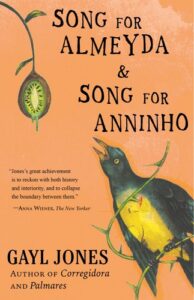The trees are tall here.
The men are tall.
The men are the color
of the black bark.
But men are not trees.
Sap is not blood.
Bark is not the flesh of men.
I do not believe the trees
can hear me singing.
I touch them.
Some vibrations of voice,
perhaps, my tenderness.
I kiss his mouth.
“What is it, Almeyda?”
“This is a good place, because it is like the place
we lived before;
like our own country.”
You rub my body with oil,
and heal the scars.
“Anninho was kind to me, Zibatra.”
“Why wouldn’t he be kind?”
“I don’t know,
but he was so kind to me, my friend,
and you must tell me,
if you can truly see into time
and transformations of place.”
“Why wouldn’t he be?” asks Zibatra.
“You gave him what he wanted.
He got between your knees, didn’t he?
Why wouldn’t he be kind?”
“Ah. More than that,” I say.
“What can I tell you?
It’s like he took hold of
me and shaped me.
How can I tell you anything
of what I feel?”
“I can hear better than most,”
she replies.
“I can hear beyond ears.”
“When Anninho and I were talking,
we saw a dead frog, the
pattern of a dead frog,
because the earth had almost
absorbed it.”
“What?”
“When we were talking there
was this dead frog,” I said,
but it was no longer a frog,
it was becoming earth;
it would soon be earth.
But it still had the smell
of a frog, and something else,
something the flies and time
had brought.
I stopped the breath from
coming in my nostrils.
And then when we got past it,
I took in breath again.
It was becoming earth, don’t you see?”
“Anninho?”
“Woman.”
I lie on my back,
somewhere on a mountain,
my body stretching as long
as your spirit, Anninho.
A magic woman is creating
visions and voices and possibilities.
I wanted my body to become one with the earth,
to become the earth.
And I saw it do so, Anninho,
the earth, the earth was me.
The flesh of the earth was my flesh.
Zibatra, the wizard woman—no witch—
leans forward and speaks to me,
and it seems that you touch my forehead, Anninho.
She speaks in tongues.
anii ennana khety inini
merikere ibihe kenikhesait
iudenet ipuiwer
And there is no translation for it.
“Do you have a man?” she asks
in Portuguese and Tupi.
“Yes, Anninho. You know it.”
“That is right. A woman like you
should have a man. A woman
such as this one should have
such a man as that one.”
“Where is he? The battle of Palmares
ended, we escaped; Portuguese soldiers
caught us at the river.
My memory does not go beyond that.
Did you not see Anninho
when you found me?”
“No. Only the globes of your breasts
floating in the river.
I wrapped them decently and hid them.
The mud on the riverbank
had stopped the bleeding.
I put you in a blanket and
brought you here . . .
I cannot find him for you.
It is you who must make the discovery.”
This earth is my history, Anninho,
none other than this whole earth.
We build our houses on top
of history.
Do you remember how it was
up in the mountains?
The sky is our symbol of immortality,
old stargazer.
Do you remember how it was, Anninho?
Why do you keep saying my name, woman?
Don’t you feel and know why?
Zibatra, the wizard woman, is here
curing my wounds.
She is not confused by time,
and so I’ve asked her to find you.
But she says I am the one
to do the finding.
She’s capable of transformations,
as if there were no boundaries
to the world—as if there were
no impossibilities in it.
Where’s Anninho? I ask her, but she tells
me that I must seek you my own self
Sometimes she lets me hear your voice—
see the black eyes I remember.
I must seek you my own self
When I am whole again,
I must go on the long journey for you.
I must make the discovery my own self
cannot find him for you, she tells me; it
is not my acts or imagination
that must find him.
She tells me stories of gods and heroes,
and claims my fever and delirium.
I struggle through memory,
wondering if when I find you,
I’ll please you—
the blood of the whole continent
running in my veins.
I am on the road again walking.
Bamboo bruises my knees.
I lift my skirt to walk through a stream.
I take off my shoes and tuck my skirt in.
There is a bird in that branch.
“Look.”
“What?”
“Did you see it?”
“What?”
“That’s all right, if you didn’t see it.”
“I said what, woman.”
“Nothing.”
“Woman.”
(Is it I or Zibatra who reverses time?
Are we really together?)
You didn’t see it, so it’s all right.
A lovely bird though, so full of color.
You look at me with admiring eyes;
I look at you so.
Zibatra rubs the back of my neck,
rubs my shoulders, and my empty bosom.
She talks of the struggles between desire and fear.
“What is your relationship to the universe,
and to me?”
She gives me fruit dipped in honey.
She rubs my body in oil.
The mosquitoes are getting blood.
__________________________________

Excerpted from Song for Almeyda and Song for Anninho available via Beacon Press.
Gayl Jones
Gayl Jones was born in Kentucky in 1949. She attended Connecticut College and Brown University, and has taught at Wellesley and the University of Michigan. Her books include Corregidora,













